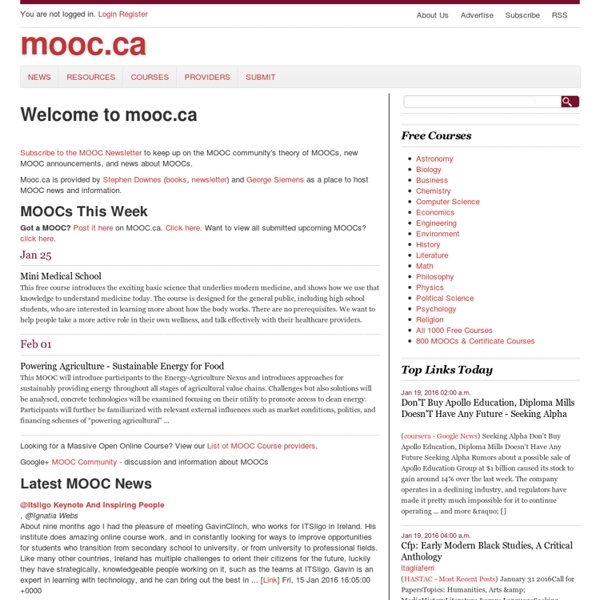



MoocGuide - 0. Home Intro to MOOC Harvard plans to boldly go with 'Spocs' Image copyright Harvard X Keep up, keep up. If you've only just caught on to the concept of online university courses called Moocs, then you're in danger of falling behind again. Harvard, one of the world's most influential universities, is moving on to Spocs - which stands for small private online courses. Nothing to do with Star Trek and sombre Vulcans, but plenty to do with ambitions "to boldly go". And could these be the real deal? Moocs - massive open online courses - have been something of a hurricane in universities, making a lot of noise and promising to rip everything up. Pioneered by some of the most prestigious US universities, they have been re-packaging course units into online lessons and making them available to anyone with an internet connection. But it's still not clear whether this is a passing storm or something that will fundamentally change how higher education is delivered. Small is beautiful Image copyright Jon Chase Enter the Spoc. National security Exam proof
mooc.org Massive open online course Education service on the web Poster, entitled "MOOC, every letter is negotiable", exploring the meaning of the words "massive open online course" A massive open online course (MOOC ) or an open online course is an online course aimed at unlimited participation and open access via the Web.[1] In addition to traditional course materials, such as filmed lectures, readings, and problem sets, many MOOCs provide interactive courses with user forums or social media discussions to support community interactions among students, professors, and teaching assistants (TAs), as well as immediate feedback to quick quizzes and assignments. MOOCs are a widely researched development in distance education,[2] first introduced in 2008,[3] that emerged as a popular mode of learning in 2012, a year called the "Year of the MOOC".[4][5][6] History[edit] What is a MOOC? Precursors[edit] Early approaches[edit] cMOOCs and xMOOCs[edit] MOOCs and open-education timeline (updated 2015 version)[13][30] Students served[edit]
Massive Open Online Course (MOOC) What Is a MOOC? A massive open online course (MOOC) is a model for delivering learning content online to any person who wants to take a course, with no limit on attendance. This updated ELI 7 Things You Should Know About MOOCs II (June 2013) provides additional key facts about MOOCs. A short video about MOOCs and the connected age. MOOC Resources How Students Engage with a Remedial English Writing MOOC: A Case Study in Learning Analytics with Big Data, ELI Brief, March 2015. Previous Events EDUCAUSE Sprint 2013, July 30–August 1. Looking for more sessions on MOOCs? MOOCs of Interest Current/Future State of Higher Education 2012. MOOC Providers
Le MOOC, mode d'emploi Le format MOOC (Massive Open Online Course) tend à prendre de l'importance dans l'offre de cours en ligne. Du moins, un nombre grandissant de cours ouverts, gratuits et en ligne sont-ils qualifiés de MOOC. Les récentes initiatives du MIT et de Stanford, que nous avons présentées dans un récent article, sont ainsi assimilées à des MOOC par Christine Cupaiuolo dans un billet publié sur le blog Spotlight. Stricto sensu, ces cours offerts gratuitement à tous ceux qui désirent les suivre relèvent effectivement de la catégorie des MOOC. Le MOOC : gratuit, en ligne, ouvert... et beaucoup plus La caractéristique essentielle d'un MOOC tient en effet au mode de construction des connaissances que ce format de cours encourage : ces savoirs et savoir-faire naissent principalement de l'interaction entre les participants au cours, entre les participants et les ressources mises à leur disposition, repérées ou produites par eux, entre les participants et les facilitateurs. Un guide pour créer un MOOC
Home If you’re interested in 1:1 mentoring, rigorous and timely project feedback, a full suite of career resources, and an industry built-and-recognized credential affirming your skills and experience, consider taking your courses as part of a Nanodegree program. To learn more, select one of the Nanodegree programs below. Senior Web Developer Nanodegree For intermediate front-end developers, this program helps you work efficiently to apply modern tools, frameworks, and techniques to write robust web applications. Beginning Ruby Nanodegree Learning Ruby—a programming language ideal for beginners—is the first step to mastering Ruby on Rails, the framework that powers sites like GitHub, Groupon, and Twitter. Android Developer Nanodegree For intermediate programmers pursuing Android mastery, this program teaches the tools, principles, and patterns that underlie all Android development. Tech Entrepreneur Nanodegree Data Analyst Nanodegree Full Stack Web Developer Nanodegree Intro to Programming Nanodegree
How to Learn Math: For Teachers and Parents | Stanford Center for Professional Development Comprised of 8 sessions, each with a run time of 10-20 minutes plus activities totaling 1 to 2 hours, the course focuses on the following concepts: 1. Knocking down the myths about math. Math is not about speed, memorization or learning lots of rules. 2. Participants will be encouraged to develop a growth mindset, they will see evidence of how mindset changes students' learning trajectories, and learn how it can be developed. 3. What is math persistence? 4. This session will give strategies to teachers and parents for helping students develop a growth mindset and will include an interview with Carol Dweck. 5. Math is a conceptual subject- we will see evidence of the importance of conceptual thinking and participants will be given number problems that can be solved in many ways and represented visually. 6. In this session we will look at and solve math problems at many different grade levels and see the difference in approaching them procedurally and conceptually. 7. 8.
Code School - Try R